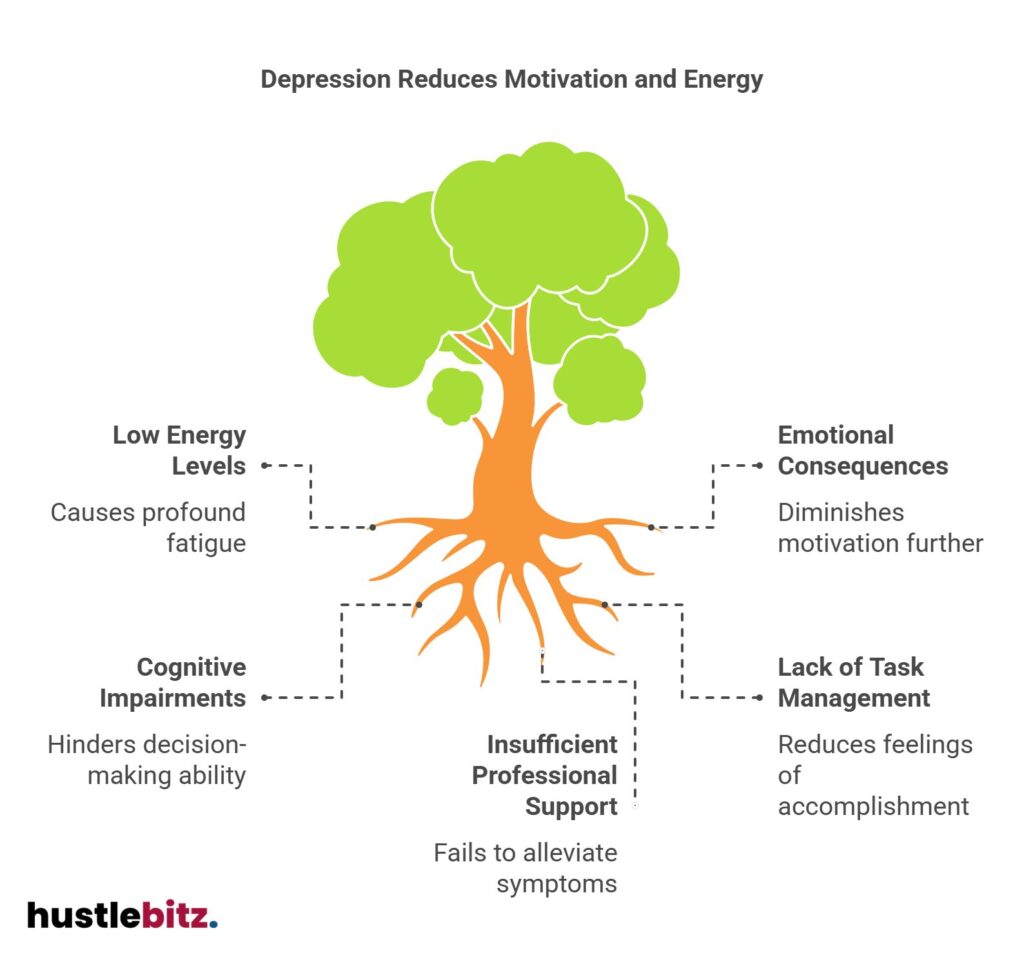Depression profoundly impacts motivation by creating significant barriers to daily functioning. Individuals often experience debilitating fatigue, emotional numbness, and loss of interest, leading to decreased drive toward pursuing goals. Cognitive difficulties, such as impaired decision-making and reduced attention span, further exacerbate motivational challenges. Social withdrawal can reinforce negative cycles, increasing feelings of despair and hopelessness. Meanwhile, lifestyle changes, support networks, and therapeutic interventions can help restore motivation. Understanding these dynamics reveals important strategies for managing depression and enhancing motivation, which may be beneficial for those seeking improvements in their mental health journey.
Key Takeaways
- Depression significantly reduces energy levels, leading to profound fatigue and a lack of drive for daily activities and goal pursuit.
- Individuals with depression experience emotional consequences, such as persistent sadness and hopelessness, which further diminish motivation.
- Cognitive impairments in depression hinder decision-making and information processing, leading to increased feelings of helplessness and diminished mental clarity.
- Task management strategies, like breaking tasks into smaller steps, can enhance feelings of accomplishment and rekindle motivation.
- Professional support, including therapy and medication, can help alleviate depressive symptoms, thereby improving overall motivation and engagement in life.

Defining Depression
Depression is a complex mental health disorder characterized by persistent feelings of sadness, hopelessness, and a diminished interest in activities once found enjoyable.
Clinically, depression is classified into various types, including major depressive disorder, persistent depressive disorder, and bipolar disorder, each with distinct symptoms and treatment options. An overview of symptoms reveals common features such as fatigue, changes in appetite, sleep disturbances, and difficulties in concentration.
Prevalence statistics indicate that depression affects millions globally, with varying rates across different age groups and cultures.
Risk factors are multifaceted, encompassing biological influences, such as genetic predisposition and neurochemical imbalances, alongside psychological theories that emphasize cognitive patterns and emotional regulation. Cultural perceptions also shape the understanding and expression of depression, influencing how individuals seek help and perceive their experiences.
Historically, perspectives on depression have evolved significantly. Once viewed as a moral failing or personal weakness, contemporary understandings recognize it as a legitimate medical condition that requires appropriate intervention.
Treatment options range from psychotherapy and medication to alternative therapies, highlighting the importance of a personalized approach in addressing the disorder.
Ultimately, defining depression requires recognition of its complexity and the interplay of various factors that contribute to its manifestation. Understanding these elements is crucial for fostering empathy and providing effective support for those affected.
The Nature of Motivation

Motivation is a psychological drive that compels individuals to initiate and sustain goal-directed behaviors, playing a critical role in personal achievement and overall well-being.
It can be broadly categorized into two types: intrinsic motivation, which arises from within an individual and is driven by personal satisfaction or interest, and extrinsic motivation, which is influenced by external factors such as rewards or recognition.
Understanding the nature of motivation is essential for effective behavioral change and personal development. Various motivation theories, including self-determination theory, emphasize the importance of intrinsic rewards and the fulfillment of basic psychological needs—autonomy, competence, and relatedness.
These theories inform motivational strategies that can enhance an individual’s drive to achieve goals.
Key points to consider include:
- Goal Setting: Establishing clear, achievable objectives can significantly enhance motivation.
- Motivational Interviewing: This technique fosters engagement and addresses ambivalence, helping individuals find their intrinsic motivation.
- Behavioral Activation: This strategy encourages individuals to engage in activities that promote positive feelings, thereby increasing motivation.
How Depression Affects Energy Levels

A significant consequence of mental health challenges is the profound impact on energy levels, often manifesting as fatigue and a pervasive lack of drive. Individuals experiencing depression frequently report energy fluctuations, where they may feel energized at times but are then overwhelmed by debilitating fatigue symptoms. This inconsistency can severely disrupt daily functioning, making even simple tasks feel insurmountable.
Sleep disturbances are another common issue, as individuals with depression may struggle with insomnia or hypersomnia, both of which exacerbate feelings of physical lethargy. The interplay between disrupted sleep and energy levels creates a vicious cycle that diminishes motivation and contributes to social withdrawal, further isolating individuals from supportive networks. Such withdrawal can reinforce negative motivation cycles, as the absence of social interaction may lead to increased feelings of hopelessness.
Brain chemistry plays a crucial role in these dynamics, with imbalances in neurotransmitters such as serotonin and dopamine contributing to reduced energy and motivation. To combat these effects, lifestyle changes can be instrumental. Incorporating regular physical activity, maintaining a balanced diet, and establishing consistent sleep patterns may help mitigate fatigue and improve overall energy levels.
Coping strategies, including mindfulness practices and structured routines, can also empower individuals to manage their symptoms more effectively. By understanding the relationship between depression and energy levels, individuals can take proactive steps towards reclaiming their motivation and enhancing their overall well-being.
Emotional Consequences of Depression

Chronic fatigue and energy depletion often accompany depression, leading to significant emotional consequences that can further complicate an individual’s mental health landscape.
The interplay of persistent sadness and emotional numbness can create a pervasive sense of hopelessness, eroding one’s ability to engage meaningfully with life. Individuals may experience mood fluctuations, oscillating between brief moments of clarity and overwhelming despair, which can exacerbate feelings of diminished self-worth.
The emotional fallout from depression frequently manifests in various ways, including:
- Loss of interest in previously enjoyed activities, leading to social withdrawal and isolation.
- Anxiety symptoms that compound existing emotional difficulties, making it challenging to cope effectively.
- A pervasive sense of hopelessness that undermines motivation and reinforces the cycle of depression.
These emotional consequences can significantly hinder the development of effective coping mechanisms. Individuals may find themselves trapped in a cycle where chronic fatigue fuels social withdrawal, further exacerbating emotional distress.
As feelings of hopelessness deepen, the motivation to seek help or engage in self-care diminishes, creating a barrier to recovery.
Understanding these emotional consequences is crucial for those affected by depression and their support systems. Recognizing the signs of emotional numbness, mood fluctuations, and feelings of hopelessness can pave the way for more effective interventions and support strategies, ultimately fostering a more hopeful outlook for recovery and emotional well-being.
How Depression Impacts Motivation

Depression significantly diminishes the drive to pursue goals and engage in daily activities, creating a profound barrier to motivation. Individuals experiencing depression often struggle with feelings of apathy and fatigue, which can hinder their ability to initiate and sustain efforts toward personal aspirations. This lack of motivation can lead to a cycle of inactivity, further exacerbating the symptoms of depression.
In addressing this impact, lifestyle changes can play a crucial role. Incorporating physical activity into daily routines not only boosts energy levels but also supports mental health. Engaging in regular exercise has been shown to release endorphins, which can improve mood and motivation. Additionally, establishing self-care routines helps individuals prioritize their well-being, making it easier to tackle daily tasks.
Social support is another vital element. Connecting with friends, family, or support groups can provide encouragement and accountability, aiding in the pursuit of goals. Coping strategies, such as mindfulness practices and positive affirmations, can also foster a more positive mindset, making it easier to overcome the inertia caused by depression.
Furthermore, employing motivational techniques like goal setting can give structure to daily life. Breaking down larger objectives into smaller, achievable tasks can enhance feelings of accomplishment and drive. Creative outlets, such as art or writing, can serve as therapeutic ways to express emotions, further rekindling motivation.
Cognitive Impacts on Decision-Making

The cognitive impairments associated with depression can significantly influence an individual’s decision-making processes, often leading to indecision and difficulty in evaluating options. Individuals experiencing depression may encounter cognitive biases that skew their perception of choices, making it challenging to engage in effective problem-solving. This is compounded by decision fatigue, which can diminish mental clarity and further impair executive function, ultimately affecting risk assessment.
Several key factors contribute to these challenges:
- Attention Span: Depressive symptoms may reduce attention span, hindering the ability to process information thoroughly.
- Emotional Reasoning: Individuals may rely heavily on emotions rather than objective facts when making decisions, leading to judgment errors.
- Information Processing: Slower information processing speeds can result in a decreased ability to weigh the pros and cons of various options effectively.
As a result, the interplay of these cognitive factors can lead to significant disruptions in decision-making capabilities. The inability to assess risks accurately can foster a sense of helplessness, further entrenching the cycle of depression.
Consequently, individuals may find themselves trapped in a loop of indecision, worsening their overall emotional state. Understanding these cognitive impacts is crucial in addressing the broader implications of depression on motivation and daily functioning, as enhanced awareness can pave the way for more informed and supportive interventions.
Seeking Professional Help
Seeking professional help is a vital step for individuals struggling with motivation issues linked to depressive symptoms, as it can provide tailored strategies and support to foster recovery. Engaging with mental health professionals opens up a variety of therapy options, including cognitive behavioral therapy (CBT), which focuses on altering negative thought patterns and enhancing motivation. Additionally, mindfulness practices can help individuals develop coping mechanisms that promote emotional regulation and resilience.
Support groups also play a crucial role in recovery, offering a safe space for individuals to share experiences and strategies. These communal environments can facilitate goal setting and self-care strategies, empowering individuals to take actionable steps towards improvement. Medication management may be necessary for some, as pharmacological interventions can alleviate depressive symptoms and enhance overall motivation.
To illustrate the different avenues of professional help available, consider the following table:
| Type of Support | Description | Benefits |
| Therapy Options | Individual or group therapy, including CBT | Personalized strategies for recovery |
| Support Groups | Peer-led meetings focusing on shared experiences | Emotional validation and community support |
| Medication Management | Prescription of antidepressants or mood stabilizers | Reduces symptoms, enhancing motivation |
Ultimately, seeking professional resources is an essential step in overcoming the challenges of depression and reigniting motivation, paving the way for meaningful lifestyle changes and improved well-being.
Final Thoughts
Understanding the impact of depression on motivation is crucial for anyone navigating this challenging mental health condition. Depression can severely diminish energy levels, emotional engagement, and cognitive functioning, creating significant barriers to daily activities and goal achievement. By recognizing how depression affects motivation through fatigue, emotional numbness, and impaired decision-making, individuals can better address these challenges. Implementing practical strategies, such as lifestyle changes, seeking professional support, and fostering social connections, can help restore motivation and improve overall well-being. Addressing these aspects proactively not only aids in managing depression but also supports a more balanced and fulfilling life.




